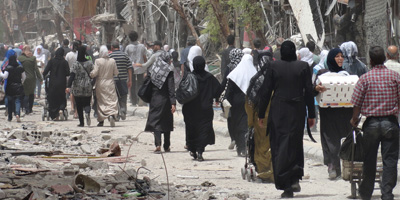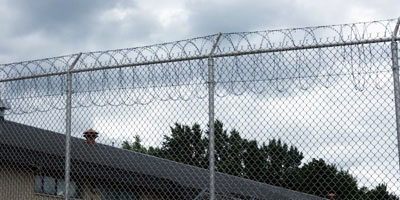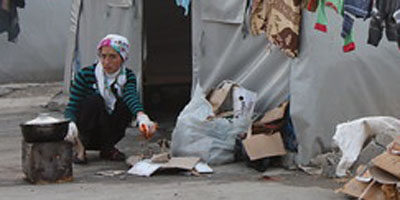Established in 1957 as an accommodation for families who were expelled from their homes during the 1948 Nakba, al-Yarmouk camp is considered the capital of the Palestinian diaspora as well as a symbol of resistance to Israel and was home to most Palestinian political parties’ headquarters.
Al-Yarmouk’s population reached more than 200,000 Palestinians in the early 2010s and was the vibrant home to many cultural and youth centers, as well as economic, political, and social organizations.
Almost all of its residents have fled al-Yarmouk camp, located in the district of Damascus, since the beginning of the war more than ten years ago. The camp is now mostly bombed out, after clashes between the Syrian government forces and the rebels, a siege, and ISIS occupation. They fled to other parts of Syria or to neighbouring countries and have lost their livelihood or financial means. As they try to overcome the layered obstacles of being Palestinian and refugees from Syria, they wait for the reconstruction of their homes. But the questions remain: when and how?
Osama Mousa, program coordinator at the SecDev Foundation, a Canadian think-tank, was born and raised in al-Yarmouk camp. He left Syria in March 2014 for Lebanon and was then able to obtain a Canadian visa in 2019. We talked about the challenges Syrian Palestinians face now that they have left al-Yarmouk.
“Some of them are living with their relatives or even people they don’t know, three or four families in small apartments in Damascus. There are a lot of security restrictions from the Syrian government towards those who are displaced,” Mousa told me. “All they want is to go back to their houses in al-Yarmouk, but these houses no longer exist.”
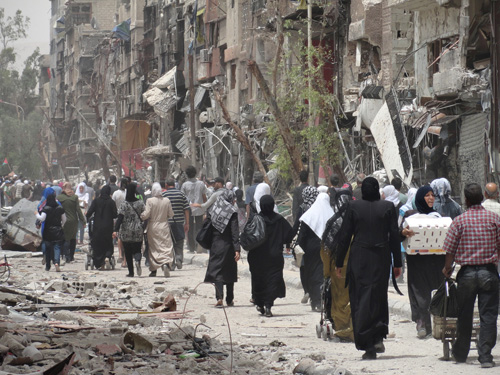
Safe to go back or no choice?
I then spoke with Wesam Sabaaneh, also born in al-Yarmouk. He is the director of the Jafra Foundation, which he and his friends originally created to provide al-Yarmouk youth with life and job skills training. Today the foundation is an NGO providing relief, educational and psychological support to Palestinian refugees and their host community and is one of the largest Palestinian civil society groups in Syria.
We spoke about the situation in the camp today. “The damage is so big, and not many people still have anything inside their homes because most of them have been looted,” Sabaaneh said. The families that went back “have rehabilitated their homes a little bit and are trying to survive because they cannot afford the rent in Damascus.”
According to a 2021 World Bank summary of the situation in Syria, the “deepening economic and political crisis in neighbouring Lebanon and the introduction of the Caesar Law [economic sanctions] have further restrained Syria’s external economic ties, leading to fuel shortages, price hikes, and a rapid depreciation in local currency.”
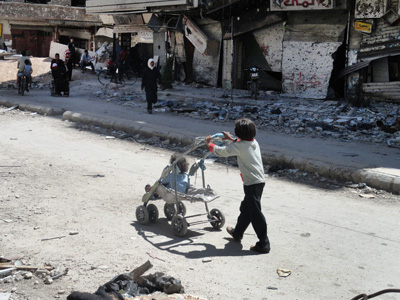
Although reconstruction has not started, families are going back. The United Nations Relief and Works Agency for Palestinian Refugees (UNRWA), a UN agency created in 1949 to support Palestinian refugees, estimates that as of March 2022 around 4,000 individuals (1,200 families) have returned to al-Yarmouk and 6,000 more families have been approved to return.
For UNRWA, the priority is to provide returned families with access to basic necessities amid unprecedented funding shortages; however, in 2022, UNRWA requires US$ 365 million to respond to the increased humanitarian needs of Palestinian refugees, but faces a $100 million deficit.
Yet, the risk of “explosive remnants of war” (unexploded shells, grenades, bombs, etc.) remains and UNRWA’s sixteen schools have been damaged.
Syrian Palestinians in Lebanon
Many people fled from al-Yarmouk to Lebanon but, as a report by the Danish Institute for International Studies put it, Syrian Palestinians “see themselves somehow forgotten in the Syrian refugee crisis.”
Crossing the Lebanese border up until 2014 was easy, often requiring only identification papers. Mousa said that entering Lebanon became more complicated for Syrians when the war started. “For Syrian Palestinians, it became almost impossible,” he said. “They need to get a security permit, but it’s unclear how to get it. You need to know someone who will submit a request.
“The residency has to be renewed every three months, just like foreigners visiting Lebanon. To apply, weirdly, you need to leave Lebanon and come back, but you cannot leave. So they will just have you come to the Lebanese General Security office to declare what you are doing, where are you living, etc.”
Mousa emphasized how these procedures weigh on the finances and the mental health of Syrian Palestinian refugees. “This just gives more and more anxiety to people,” he said. “They’re not allowed to work, but every year they need to pay about two hundred dollars in residency fees. Just imagine, for a family with five or six members it would cost over a thousand dollars a year.”
UNRWA used to pay these fees directly to the Lebanese government, but there were severe funding shortages after the Trump administration cut all aid in 2018.
Double penalty for women
Travel authorizations are often given to men first because they are the most at risk of being recruited by opposition’s armed groups. “The direct stress on men’s lives is obvious,” Mousa said. “The forgotten people will be mostly women.”
Women are also left out of resource management although they are often the ones responsible for the day-to-day survival of their families. “If they don’t find something to eat, the children will starve,” Mousa said. “And they did starve because of this lack of humanity and also of common sense sometimes. If you think about food in refugee camps or UN’s cash distributions, women will be prioritized because they are the breadwinners for their children. Still, any man, or their relatives, living in the same camp can claim any resources and they will use their power advantages to force how these resources will be managed.”
Reconstruction anytime soon?
“The conflict is still ongoing,” Mousa said. “The chaos is still ongoing. Nothing changed. There are no negotiations. I understand the fatigue; it’s been ten years of war. Yes, it’s ten years of war, not post-conflict.”
In 2018, when the Russian and Syrian governments took back al-Yarmouk from ISIS, rumours of reconstruction circulated in local media. “They said: ‘It’s safe so now let’s rebuild!’ But now it’s 2022. Nothing happened. Even the rebels weren’t removed until today, after four years,” Mousa said.
“I think reconstruction will come with a political settlement, and I don’t think anybody’s ready for a peace settlement agreement,” Sabaaneh said. “Now we speak about early recovery or livelihood, not reconstruction. We cannot speak about reconstruction under sanctions, that doesn’t work.”
For both Mousa and Sabaaneh, reconstruction is a political decision. “The government will need at least hundreds of billions of dollars,” Sabaaneh said. “This is an international community or big bank decision and until now I don’t see any motivation from big money.”
China, for example, has diplomatic ties with Syria and has the funds to invest, but won’t do it just yet. “Not because it is not willing, but because the situation does not permit to do such investments, you never know what will happen,” Mousa said.
The Syrian government has been pushing for UNRWA to fund al-Yarmouk’s reconstruction because of its special character as home to Palestinian refugees. Mousa believes this is to fulfill its political agenda. “They want to use it as an example,” he said. “‘This is how we liberate areas from terrorism. We liberated the camp from ISIS and now we are already rebuilding.’”
Rebuilding al-Yarmouk’s identity?
Syrian Palestinians doubt whether or not reconstruction will be able to safeguard al-Yarmouk’s identity and legacy. The political, geopolitical, cultural, and economic aspects of the camp would be destroyed if it were rebuilt as a regular Damascus neighbourhood. “All the special identity that the camp used to represent, will be gone,” Mousa said. “And it’s going to be just Yarmouk without even the word camp.”
Reconstruction goes beyond buildings and streets. Mousa believes that it is as much a matter of urban planning as it is of anthropology. ”If you rebuild this area, and in two or three years you have a conflict again, it’s just hiding the situation under the carpet,” he said.
With the war and displacement, many people have lost their property documents, or sometimes don’t even know if their relatives, who own family buildings, are alive or dead. “Government facilities that have the archives of these papers have been burned out and messed up,” Sabaaneh said. These legal obstacles will make it even harder for inhabitants to be able to fully participate in the reconstruction process.
“Palestinian Syrians, we are very active economically, socially, culturally. We had big writers, TV stars, teachers, universities, doctors, engineers, all this,” Sabaaneh said. “Now there’s hope that this will come back, but there will be difficulties, especially with the collapse of UNRWA. With the internal economic situation of Syria because of the sanctions, and because of the war, and because of infrastructure damage, it will be very difficult for Palestinians in Syria and Syrians in general. And I think that there’s an international responsibility.”

